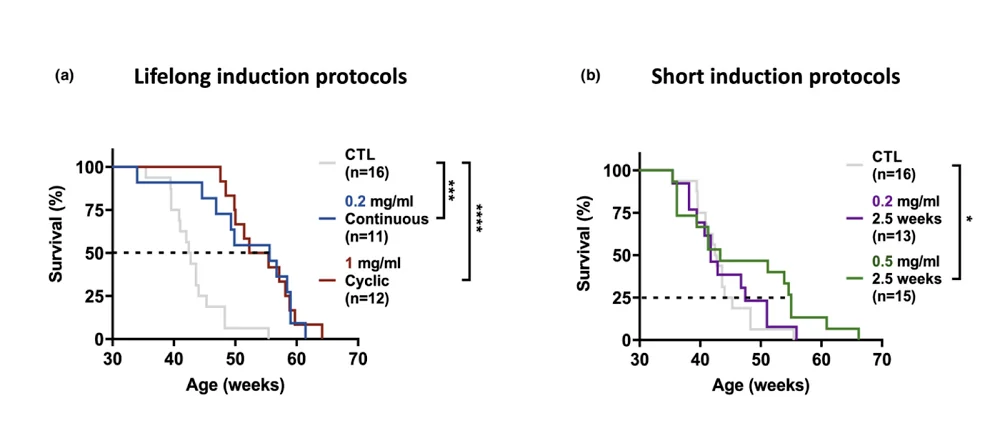Scientists have shown that continuous low-dose induction of reprogramming factors and a single early life reprogramming treatment both significantly increase lifespan and healthspan in progeroid mice while altering their epigenetic landscape [1].
In vivo reprogramming
Cellular reprogramming is the process of treating cells with compounds that nudge them towards a pluripotent state. The classical reprogramming tool is the four-factor OSKM protein cocktail introduced by Shinya Yamanaka in 2006 [2], but since then, other factors have been proposed, including small molecules. Importantly, reprogramming is accompanied by cellular rejuvenation [3].
In its full form, reprogramming abrogates the cells’ differentiation, completely driving them to pluripotency. They are then called induced pluripotent stem cells (iPSCs) and can differentiate again into various cell types. When milder protocols are used, it is possible to rejuvenate cells without rolling back their cellular identities [4].
While cellular reprogramming holds great promise, it is a nascent technology with many open questions. Most studies are done in vitro, and only a handful have investigated the effects of reprogramming in vivo, with some encouraging results. This study joins that limited list.
Lifespan boost for half-progeroid mice
The researchers used progeroid mice, which were genetically modified to express a premature aging phenotype. When this mutation is homozygous (both sister chromosomes carry the progeroid modification), such mice live extremely short lives of about 15 weeks. Similar mice were used in the important 2016 study by Ocampo et al. that showed the rejuvenating effects of partial reprogramming [5].
To attenuate this phenotype and make it more resemble natural aging, in this study, the researchers used heterozygous mice, with one sister chromosome being modified and one remaining unmodified. Those hybrids’ average lifespan is 35 weeks, about a third of normal. Additional genetic alterations allowed the mice to express reprogramming factors only when the drug doxycycline was added to their drinking water. In previous studies, the mice were regularly “pulsed” with doses of doxycycline, turning OSKM expression on and off to avoid full reprogramming. However, in this study, the researchers attempted a different, simpler approach, constantly adding a smaller dose of the drug to the drinking water.
If done wrong, the experiment could have resulted in full reprogramming and consequent formation of tumors. However, the bet paid off. Not only were the treated mice much healthier than the controls, but they also lived longer. A lifelong treatment with 0.2 mg/ml of doxycycline yielded almost the same results as the more conventional 1 mg/ml periodic treatment, extending the mice’s median age of death from 42.6 to 55.6?weeks.
However, there was another big surprise. When the researchers tried limiting the treatment to a period of 2.5 weeks early in life, they still got a noticeable lifespan extension with a “middle ground” dose of 0.5 mg/ml. The increase in maximum lifespan was even more impressive than with the lifelong treatment (66.1 weeks). However, because of the small sample size, this particular result should be taken with caution.

Improved health and fitness
The single treatment protocol also resulted in noticeable improvements in fitness. Treated mice developed and maintained substantially more lean mass and higher ratios of lean mass to fat, and they continuously scored better than controls on strength tests.
On the histological level, the single treatment seemed to provide lifelong protection against age-related skin thinning and loss of elasticity up until the age of 8 months, when the last tests were done. The lungs, spleens, and kidneys of the treated mice were also in a much better shape than those of controls, with preserved function and less fibrosis.
Just like naturally aging animals (humans included), progeroid mice develop a wide range of age-related conditions, including bone and cartilage degeneration. A single early life treatment was able to significantly slow it, as measured by bone mass in major bones, cartilage volume, and cartilage degradation.
Epigenetic anti-aging protection
Since aging is closely associated with epigenetic alterations (namely, the distribution of methylation marks across the genome), the researchers compared methylation profiles of the study group versus controls at various points in time. The results showed that the single early life treatment is generally protective against age-related changes in methylation.
However, methylation differences between the study group and controls were not the same at 2 months and 8 months of age. This means that the initial epigenetic reprogramming induced by the treatment was not maintained but rather “propagated” – its profile changed with time via a currently unknown mechanism while still ensuring that the treated mice lived longer.
Conclusion
The major limitations of this study are its use of progeroid mice, albeit heterozygous, and a relatively small sample size. However, the results are impressive: the study shows that safe and effective partial reprogramming that extends healthspan and lifespan can be induced both by a continuous lifelong treatment and a single treatment early in life. The next step would be to replicate these results in naturally aging animals.
Literature
[1] Alle, Q., Le Borgne, E., Bensadoun, P., Lemey, C., Béchir, N., Gabanou, M., … & Lemaitre, J. M. (2022). A single short reprogramming early in life initiates and propagates an epigenetically related mechanism improving fitness and promoting an increased healthy lifespan. Aging Cell, e13714.
[2] Takahashi, K., & Yamanaka, S. (2006). Induction of pluripotent stem cells from mouse embryonic and adult fibroblast cultures by defined factors. cell, 126(4), 663-676.
[3] Simpson, D. J., Olova, N. N., & Chandra, T. (2021). Cellular reprogramming and epigenetic rejuvenation. Clinical Epigenetics, 13(1), 1-10.
[4] Lehmann, M., Canatelli-Mallat, M., Chiavellini, P., Cónsole, G. M., Gallardo, M. D., & Goya, R. G. (2019). Partial reprogramming as an emerging strategy for safe induced cell generation and rejuvenation. Current Gene Therapy, 19(4), 248-254.
[5] Ocampo, A., Reddy, P., Martinez-Redondo, P., Platero-Luengo, A., Hatanaka, F., Hishida, T., … & Belmonte, J. C. I. (2016). In vivo amelioration of age-associated hallmarks by partial reprogramming. Cell, 167(7), 1719-1733.




